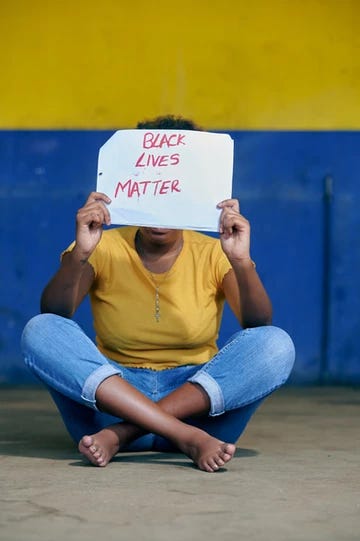The ongoing conflict in Ukraine, now over three and a half years since Russia's full-scale invasion, offers a stark, yet often misunderstood, lens through which to examine the interconnectedness of global affairs, particularly the alarming rise of white nationalism and its surprising ties to the struggle for Black liberation. As the world grapples with shifting geopolitical alliances and internal societal fissures, it becomes increasingly clear that seemingly disparate events—from the streets of Ferguson to the battlefields of Ukraine—are threads in a larger, more complex tapestry of power, race, and identity.
The Media's Myopia: "They're Just Like Us" – Unless They're Not
At the outset of the Russia-Ukraine War, Western media's framing of the crisis was both empathetic and, for many, deeply revealing of inherent biases. Phrases like "things like this don't happen to people like us" and "they look like our children, our mothers, our sisters" were common, expressing a shared sense of humanity with Ukrainian refugees. However, this empathy often felt exclusive, raising a critical question for Black and Brown communities globally: where is this same fervent outcry, this same compassionate lens, when similar atrocities befall people in Muslim or African nations?
The irony, as foreign affairs correspondent Terrell Jermaine Starr points out from his extensive time in Ukraine, is that even this seemingly empathetic coverage was tinged with colonial ignorance. While highlighting the tragedy, the media failed to adequately acknowledge the centuries of Russian colonialism and brutality that have shaped Ukraine's history. This historical amnesia prevents a true understanding of Ukraine's struggles, often viewing them solely through the prism of Moscow's narratives. Despite newfound independence, Ukraine's identity has long been suppressed, a reality that the predominantly white international media, operating with a colonial lens, continues to overlook.
Shared Struggles: Ferguson, Maidan, and the Fight Against State Violence
Remarkably, the parallels between the struggle for Black liberation in the United States and Ukraine's quest for self-determination run deeper than superficial observation. The year 2014 stands as a critical juncture for both. In the fall of 2014, the Ferguson uprisings in the U.S. brought global attention to police brutality against Black Americans. Earlier that same year, Ukraine experienced the Maidan Revolution, a "revolution of freedom," also sparked by police violence, where over a hundred individuals were killed by state security forces. Both movements leveraged social media to amplify their narratives and challenge established power structures.
Yet, these crucial parallels often go unexamined, largely due to a severe lack of diversity within foreign policy circles and media. The field of Russian and Eastern European studies, for instance, has historically produced very few Black specialists. This systemic exclusion means that critical perspectives, which could draw these vital connections and offer a less racist, more nuanced understanding of global events, are often absent. When Black journalists and academics do enter these spaces, they often find themselves singular voices against a chorus that reinforces existing biases, making the work of drawing these parallels incredibly challenging.
The Weaponization of Whiteness: A Global Phenomenon
A profound and unsettling truth emerging from the current geopolitical climate is the weaponization of whiteness, not just against Black and Brown communities, but increasingly against certain white populations themselves. Donald Trump Jr.'s notorious tweet referring to Ukrainians as "international welfare queens" — echoing Ronald Reagan's racist trope about Black women — serves as a stark example. This language, now mainstreamed by figures like Marjorie Taylor Greene and the MAGA contingency, frames Ukrainian aid as an undue burden, a drain on American resources. It's a clear illustration of how racialized language, traditionally deployed against Black communities, can be adapted to undermine support for other groups, even white ones, when their utility to a particular political agenda wanes.
This reveals a crucial dynamic: for certain factions of white nationalism, particularly those aligned with Trump's ideology, whiteness is conditional. If a white population, like Ukrainians, is perceived as being "of no use" or as a drain, they too can be discarded. Unlike South Africa, where Trump's base could readily target a Black population with grievances, Ukraine presents a challenge due to its predominantly white demographic. This forces a deeper, more uncomfortable reckoning for Ukrainians about their place within a global white supremacist hierarchy. Their "complexion for the protection" is revealed as unreliable when it conflicts with the interests of a rising authoritarian and white nationalist movement.
The Axis of Authoritarianism: A Global White Nationalist Front
The current era marks a dangerous re-imagining of white nationalist power on a global scale. This is not simply a domestic issue of white versus Black or Brown within the United States. It's a global alignment of authoritarian regimes and nationalist movements, epitomized by leaders like Hungary's Viktor Orban, France's Marine Le Pen, Germany's Alternative for Deutschland (AfD), and Slovakia's Robert Fico. These leaders share a common playbook: exploiting fears of whiteness under threat from immigration—particularly from Muslim and African populations—to consolidate power through isolationism and the redlining of electoral systems.
This international convergence of white supremacists and authoritarians operates on a simple, yet potent, consensus: while they may have internal disagreements, they are united in their belief that their racial dominance is being challenged. Instead of embracing integration, which has been shown to work in many contexts, they push for segregation, scapegoating immigrants, and fostering a "them versus us" mentality.
The danger for Black and Brown communities lies in their historical under-engagement in foreign policy discussions. While these communities are often pitted against each other through ethnic divisions, global white supremacist elites view them collectively as "the rest of us." Trump's willingness to "throw out" hundreds of thousands of Ukrainians, despite their war-torn homeland, mirrors the apathy shown by some Republicans towards the opioid crisis ravaging predominantly white, poor communities in the American South. The common thread is a disregard for human suffering when it does not serve the elite's agenda.
Bridging the Divide: The Imperative for Collective Action
The current global landscape demands a radical shift in perspective. The "zero-sum mentality"—the idea that if one group has suffered, another's suffering is irrelevant—is a trap designed to prevent collective action. While the past treatment of Black refugees fleeing Ukraine was undeniably racist and unacceptable, understanding the systemic failures, including the lack of preparedness of Ukrainian authorities and the inadequate support from African embassies, is crucial. The racism that occurred does not excuse it, but it contextualizes the chaos and allows for a broader understanding of vulnerability.
The historical strength of the Black press, once a powerful engine for informing and mobilizing communities, serves as a reminder of the need for dedicated platforms that can draw these global connections. In today's fragmented digital world, it's more challenging than ever to consolidate information and foster a collective consciousness about these interwoven struggles.
Ultimately, the global push for white nationalism and authoritarianism represents an existential threat to all marginalized groups. If Black people and people of color fail to recognize the international nature of this threat and unite against it, the individual battles, no matter how righteous, will be continuously ensnared and ultimately consumed by this larger, pervasive force. The Russia-Ukraine War, then, is not just a regional conflict; it is a global flashpoint exposing the insidious, adaptable, and far-reaching nature of white nationalism, urging us all to connect the dots and forge new alliances for liberation.

















Share this post